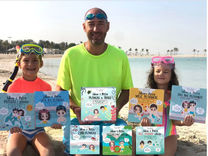Blog guest: Nana
- Feb 18, 2019
- 3 min read
Updated: Apr 1, 2020
The reasons why music and rhymes are important for a baby’s, child’s development, regardless of whether they’re on the grass or in the pool, and the ways in which parents can contribute to the first musical experience of their kids, either in the water or on the dry, are revealed for the Swimming Dad by our #Blog guest, Miljana Majstorović – Kožul, popularly known among kids as Nana, a defectologist, a musical baby bonding instructor and a teacher, but also a mother of a wonderful girl.
1. Why is music, a rhyme important for the development of babies, children, regardless of whether they’re on the “dry” (grass, home) or in the water (pool)?
Music and musical activities for babies, small children, but also adults, have the significance which goes beyond the obvious. They have a different role at a different point in a child’s life. Stimulation, consolation, excitement, affirmation, social, cognitive, aesthetic, linguistic, motoric satisfaction are some of the most significant developmental aspects when it comes to the importance of music, and its use at an early age. When we take a look at the list of the mentioned aspects, it seems quite long, and gives the impression of a comprehensive and overall impact on a small developing creature.
2. How can parents contribute to the first musical experience their babies, children have either on the grass or in the water?
To understand the children’s musical world and its impact on children’s development, which normally goes hand in hand with the musical development, the first task we as adults are to do is to “clean” all our “adult” thoughts from how we see music, what music is for us, how it was made, and what it means. Music is just another part of their sensory world. Children respond to music with a combination of responses. They move as they listen, they dance as they play, they communicate though it… So, to experience it, and bring it closer to children, music must be seen, heard, felt, and that requires some experience. So, all children should be exposed to musical experience and have music in their environment so that, along with the development, they could develop sensitivity, and start mastering musical skills, in order to appreciate music once they grow older. This refers to an early age starting from their birth, and early years of experience, but also to later stages of their lives.
3. What is the best moment for their first musical experience?
If you ask me, I will say intrauterine. As I also work with pregnant women, apart from relaxing, bonding with the baby, and playing music with other mums, our focus is also on the baby itself, and its intrauterine development. Singing during pregnancy has a great impact on the baby, but, of course, it doesn’t stop here. Once the baby arrives, we follow up that musical experience with specifically adjusted sound activities. I would underline here the mum’s voice as the most magnificent instrument, which is again the most important one for the baby in the first months of his/her life, having a regulating, but also a stimulating effect. So, sing as if nobody is listening to you (apart from you child) . Later, as the baby is developing, the musical activities change, but the musical experience should not stop. Foster it, look for useful musical programmes, lessons, or workshops to enhance your everyday life, and get some creative and practical ideas, and there is always room for improvising. In this way, you will support, empower, awake, and promote music with no effort . Once the child starts going to school, if he/she shows an interest in further musical development, a music school is an ideal way to build on the musical experience.



























































Comments